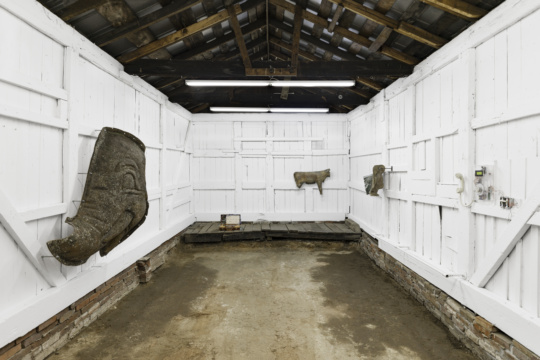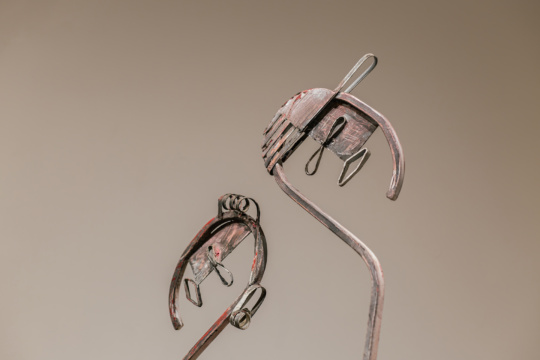
Dear BURNAWAY,
I’ve had two solo shows in the last couple of years that received absolutely no press coverage. It’s like they never happened!! It’s not that I’m desperate to become famous or anything. I’m trying to get a better position at the college I currently teach at, which is a nightmare as you can probably guess, and I need all the help I can get. Reviews looks good on a resume. Should I ask some of the local writers to write about my next show? What if they are good friends? Please advise.
Sincerely,
Invisible in Atlanta
Dear Invisible,
First off, love bug, I’m sorry to hear about your unsatisfactory press presence in recent years, I truly am. Creative beings desperately need feedback, criticism, recognition! Otherwise, you feel like you’re adrift in an endless sea, violently waving your arms: “Look! Over here! I exist! I am doing things!” Deep down, we want people to love our work, even hate our work, but not to ignore our work. That’s a real knife to the heart.
As my main man Aristotle once said: “To avoid criticism say nothing, do nothing, be nothing.” I think most artists, writers, dancers, etc., know deep down in their bones that if no one is talking about your work — good or bad — then it’s not working; you may not actually be saying anything, doing anything, or being anything. Participating in a broader dialogue is a major part of being an artist — a redeeming, invigorating one at that. So I understand your frustration, and I get that it’s not coming from a some sleazy place of fame-seeking.
I also feel for you because you are swimming in the shark tank that is academia. Ahhh yes, hundreds of highly qualified people bare-knuckle fighting for a single position with a paltry-as-hell salary and virtually no job security. It’s a horrible situation; it really is. Alas, I could discuss the dismal state of academia ad nauseam, but I’ll spare you since you clearly know what you’re up against. (Godspeed, good soldier.)

Thus, yes, any tiny little leg up is a mark in your favor. When it comes to the academic rat race, every mention of your name on a printed page, non-printed page, or gust of wind, needs to be documented, calculated, saved, and protected for your tenure-making dossier.
But university life aside, reviews are important for all artists. Not only do they (hopefully) offer a critical perspective on your work that can help you grow and mature in your practice, they give you a written trail that can help you gain recognition in the eyes of the greater art community.
But here’s the thing: unfortunately, it is terribly uncouth to ask an art writer to review your show. I hate to tell you that, but it’s the truth. For starters, EVERYBODY wants their show reviewed, and art writers know that. You don’t have to emphasize it, or try to butter them up, or win them over. It won’t work. In fact, one of the most annoying (and sad and kind of amusing) parts of being an art writer is that artists and curators suddenly become your best buds when their show is up! They want to hang out, they want to catch up. It’s just part of it, but you, sweet dumpling, don’t want to be like that. Furthermore, if you bug them about covering your show, it could make them less likely to write about it at all.
Take this into consideration: maybe they aren’t writing about your show because they don’t like it. Asking them to write about it won’t change their opinion, but it may result in them publishing something negative or lackluster about your show. Which would suck. If they are interested in it, and have the information they need, they’ll make the effort.
Secondly, it doesn’t help if the potential reviewer is your good friend, because then you’ve got a major conflict of interest that most publications wouldn’t go for — or might get a bit squeamish about. So that road may not be best. Plus, you might end up putting your friend in a weird spot, and that ain’t cool, yo.
Last but not least, do not even think about offering to pay them (or barter with them) to write up your show. Please! Major no-no. These are critics with a reputation to uphold, not your PR whores.
The best thing you can do is make a stellar press release for your show with loads of information about you and your work, and get a few really great hi-res images of pieces in the show. Don’t forget to send the release out early! As in, a month before your opening. Make sure to get the word out as soon as possible so writers and editors can try to schedule it in. Preface the release with a kind note inviting them to the opening, and you’re good to go! Good luck, my dear!
Got a question for Sara? Send an email to [email protected].
Sara Estes is a writer and curator based in Nashville. She currently works at David Lusk Gallery and is the former gallery coordinator for the Carl Van Vechten and Aaron Douglas Galleries at Fisk University. She is also the apprentice to paintings conservator Cynthia Stow of Cumberland Art Conservation. Estes is the cofounder and curator of the Nashville-based contemporary exhibition space Threesquared. Her writing has been featured in numerous publications, including BURNAWAY, Number, Nashville Scene, Nashville Arts Magazine, ArtsNash, and ArtNow.




